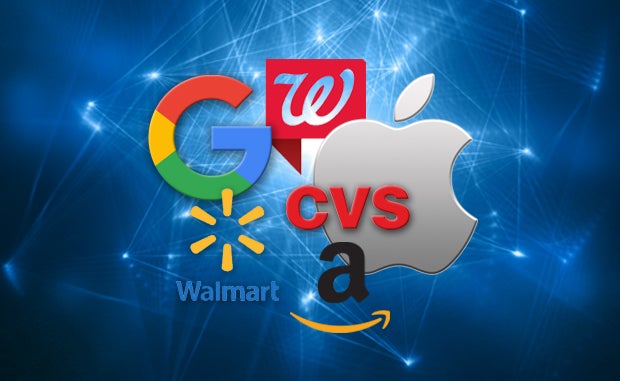

COVID-19 Didn’t Stop Health Care Disruptors from Moving Forward

Amid the COVID-19 pandemic turbulence last year, some of America’s largest companies were forced to reexamine their strategies to disrupt health care in an effort to reduce costs, increase access and forge stronger bonds with consumers. Some, like Amazon, CVS Health, Walgreens Boots Alliance and Walmart, added to the number of their early brick-and-mortar primary care locations to serve their customers or employees. The coming year will tell a lot about whether they can successfully scale these initiatives. Here’s where they’ve landed for now.
Amazon
 For all its efforts to disrupt health care by increasing primary care access, simplifying insurance benefits and reducing costs, Amazon and its partners JPMorgan Chase and Berkshire Hathaway ultimately failed at their greatest ambition: to develop models that they and other employers could use. Haven, the much-ballyhooed joint venture formed in 2018 by the tech and finance giants, began disbanding as 2020 closed, roughly six months after Atul Gawande, M.D., stepped down as CEO. While Haven generated big ideas for reducing health expenses, the companies ultimately went their own ways in implementing programs for their employees. The firms still plan to collaborate informally on health care projects but without a central infrastructure to oversee the efforts.
For all its efforts to disrupt health care by increasing primary care access, simplifying insurance benefits and reducing costs, Amazon and its partners JPMorgan Chase and Berkshire Hathaway ultimately failed at their greatest ambition: to develop models that they and other employers could use. Haven, the much-ballyhooed joint venture formed in 2018 by the tech and finance giants, began disbanding as 2020 closed, roughly six months after Atul Gawande, M.D., stepped down as CEO. While Haven generated big ideas for reducing health expenses, the companies ultimately went their own ways in implementing programs for their employees. The firms still plan to collaborate informally on health care projects but without a central infrastructure to oversee the efforts.
As part of its future focus, Amazon plans to build a national telehealth business targeted to large employers. The company also made its initial foray into the wearables market with Amazon Halo, a wrist health tracker and an app that tracks activity, sleep and measures body fat percentage.
Apple
 Apple continued to make inroads in health care through strategic acquisitions, expansion of its electronic health record (EHR) platform and broadening clinical information that can be captured through its wearable devices. The tech giant purchased AI startup Xnor.ai for about $200 million. The deal suggests that Xnor’s AI-enabled, image-recognition tools could become standard features in future iPhones and webcams. How Apple might apply these capabilities from a health care perspective remains to be seen.
Apple continued to make inroads in health care through strategic acquisitions, expansion of its electronic health record (EHR) platform and broadening clinical information that can be captured through its wearable devices. The tech giant purchased AI startup Xnor.ai for about $200 million. The deal suggests that Xnor’s AI-enabled, image-recognition tools could become standard features in future iPhones and webcams. How Apple might apply these capabilities from a health care perspective remains to be seen.
Meanwhile, Apple Health Records gained traction, expanding into the UK and Canada. The personal health record feature, supported by more than 500 U.S. institutions with more than 11,000 care locations, combines data from a patient’s EHR with other daily health and wellness information housed in the iPhone’s health application. The company also obtained FDA clearance to detect AFib in patients with heart rates up to 150 beats per minute.
CVS Health/Aetna
 CVS Health progressed toward its goal of converting 1,500 of its U.S. stores to HealthHUB locations by the end of 2021. It opened 659 HealthHUBs in 2020, up from 50 locations the year prior. HealthHUBs are CVS' redesigned health-focused concept stores with space dedicated to helping customers manage chronic conditions like diabetes, hypertension and asthma. Each store features an expanded health clinic with a lab for blood testing and health screenings as well as wellness rooms.
CVS Health progressed toward its goal of converting 1,500 of its U.S. stores to HealthHUB locations by the end of 2021. It opened 659 HealthHUBs in 2020, up from 50 locations the year prior. HealthHUBs are CVS' redesigned health-focused concept stores with space dedicated to helping customers manage chronic conditions like diabetes, hypertension and asthma. Each store features an expanded health clinic with a lab for blood testing and health screenings as well as wellness rooms.
The company also broadened its health care reach by offering an insurance plan in Kansas City with its subsidiary Aetna that integrates both companies' services. The program will connect with Aetna’s I-35 Performance Network, which includes 1,200 primary care physicians, 8,300 specialists, 13 hospitals and 32 urgent care facilities. The Aetna Connected Plan with CVS Health is marketed to companies with more than 100 employees and includes such CVS Health services as no copays at CVS’ MinuteClinic locations, free one- to two-day delivery on prescriptions and 20% discounts on thousands of health care products. CVS also furthered its efforts to address social determinants of health by committing $600 million over the next five years to reduce health disparities.
Google Health/Alphabet
 Alphabet’s health care trio — Verily, Google Cloud and Google Health — made further inroads into clinical and research arenas. Google’s artificial intelligence (AI) proved to be more accurate in identifying breast cancer from mammograms than by doctors, according to a study published in Nature. Initial results found that the system was able to reduce the number of false positives and false negatives in breast cancer detection.
Alphabet’s health care trio — Verily, Google Cloud and Google Health — made further inroads into clinical and research arenas. Google’s artificial intelligence (AI) proved to be more accurate in identifying breast cancer from mammograms than by doctors, according to a study published in Nature. Initial results found that the system was able to reduce the number of false positives and false negatives in breast cancer detection.
Alphabet’s life science subsidiary Verily launched the Coefficient Company. Coefficient health insurance targets self-funded employers and is pitched as stop-loss insurance. Verily hopes that by adding its data-crunching and technological capabilities to the equation, it can help employers more accurately assess the risks they face and, eventually, intervene to better predict and control health care spending on individual employees, Bloomberg notes.
Walgreens Boots Alliance
 Reshaping its strategy with a $1 billion commitment, Walgreens Boots Alliance teamed with primary care provider VillageMD on a plan to open 500 to 700 full-service doctors’ offices in 30 markets over the next five years alongside the retail pharmacy chain’s stores. The physician-led primary care clinics will integrate with Walgreens pharmacists and offer a broad range of clinical services, with more than half the clinics located in health professional shortage areas and medically underserved areas. In addition, telehealth services will be available 24/7 and at-home visits will be offered.
Reshaping its strategy with a $1 billion commitment, Walgreens Boots Alliance teamed with primary care provider VillageMD on a plan to open 500 to 700 full-service doctors’ offices in 30 markets over the next five years alongside the retail pharmacy chain’s stores. The physician-led primary care clinics will integrate with Walgreens pharmacists and offer a broad range of clinical services, with more than half the clinics located in health professional shortage areas and medically underserved areas. In addition, telehealth services will be available 24/7 and at-home visits will be offered.
Walgreens also broadened its focus to help patients navigate their health coverage options. Find Rx Coverage Advisor will provide personalized guidance to customers seeking information on available health and prescription drug coverage options, including Medicaid, Medicare Advantage and Medicare Part D plans.
Walmart
 While moving more deliberately than CVS Health and Walgreens Boots Alliance, Walmart picked up the pace in opening Walmart Health supercenters to deliver primary care and dental services. The big-box retailer opened health clinics in Georgia, Illinois, Arkansas and Florida and said it plans to have 22 health supercenters operating by the end of 2021. The clinics charge a flat fee for services regardless of insurance status — sometimes at prices below an insured patient’s copay amount. The clinics offer on-site services such as lab testing, behavioral health, wellness and eye care. The stores currently make referrals for specialist care, but the company’s president of health and wellness told MedCity News last summer that Walmart may offer some specialty services in the future.
While moving more deliberately than CVS Health and Walgreens Boots Alliance, Walmart picked up the pace in opening Walmart Health supercenters to deliver primary care and dental services. The big-box retailer opened health clinics in Georgia, Illinois, Arkansas and Florida and said it plans to have 22 health supercenters operating by the end of 2021. The clinics charge a flat fee for services regardless of insurance status — sometimes at prices below an insured patient’s copay amount. The clinics offer on-site services such as lab testing, behavioral health, wellness and eye care. The stores currently make referrals for specialist care, but the company’s president of health and wellness told MedCity News last summer that Walmart may offer some specialty services in the future.
Walmart entered a new phase in its efforts to win consumer loyalty in health care by becoming a licensed health insurance broker. It now collaborates with national and regional insurance carriers like Amerigroup, Anthem Blue Cross Blue Shield, Centene, Clover Health, Humana, United Healthcare and others to offer Medicare Advantage and Part D drug benefits.



